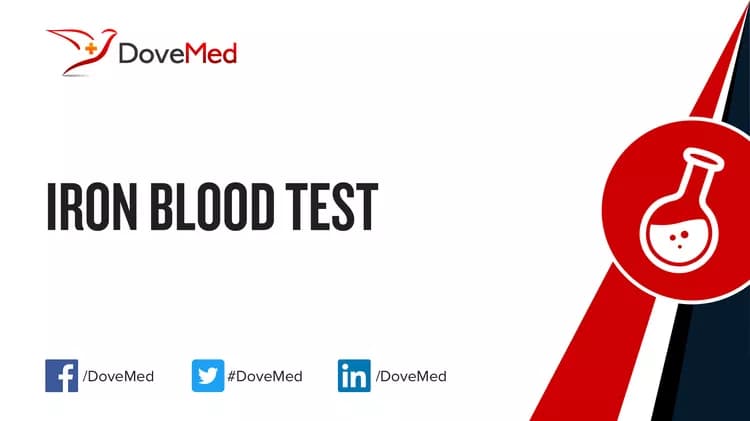What are the other Names for this Test? (Equivalent Terms)
- Fe Test
- Iron Indices Test
- Serum Iron Test
What is Iron Blood Test? (Background Information)
- An Iron Blood Test (or Serum Iron Level Test) determines the quantity of iron that is free-floating in the serum
- Iron is an important component of hemoglobin, a protein molecule that transports oxygen within the red blood cells. Iron is also part of important enzymes. which help in functioning of the human body
- A majority of the body’s iron (67%) is present within immature red cells in the bone marrow and within the red blood cells circulating in the peripheral blood vessels. The iron is stored within macrophages of the human body either as ferritin or as hemosiderin
- When the iron is consumed through diet, it is absorbed in the gastrointestinal tract and transported to its storage through a protein molecule called transferrin
- Generally, once absorbed, iron is not lost from the body. A small amount of iron is lost through the gastrointestinal tract. It is also lost in women, through their menstrual bleeding.
What are the Clinical Indications for performing the Iron Blood Test?
There is a wide variation in the level of serum iron. They also get transferred over a short period of time, by a variety of factors, including due to dietary intake of iron. Hence, it is important to interpret the serum iron levels in context of other tests for iron metabolism such as ferritin, transferrin, and total iron-binding capacity.
Whenever an iron deficiency is suspected, a panel of tests to determine the level of iron in the body is performed. This panel may include the following:
- Complete blood count
- Hemoglobin level
- Hematocrit, ferritin, transferrin levels
- Total iron binding capacity
The signs and symptoms of an iron deficiency anemia include:
- Easy fatigability
- Headaches
- Pallor of skin, conjunctiva, and mucous membrane
- Burning or soreness of tongue
- Ulcers in the corner of the mouth
In severe iron deficiency anemia, there is a marked decrease in oxygen-carrying capacity of the blood. This results in a compensatory increase in cardiac function wherein the heart beats faster. In this scenario, individuals may experience palpitations.
Iron studies can also be ordered to diagnose Pica (a ‘non-food materials’ eating disorder). The signs and symptoms of PICA include unusual craving to eat dirt or ice, spoon-shaped nails (koilonychias) and difficulty in swallowing.
How is the Specimen Collected for Iron Blood Test?
Specimen required: Blood
Process: A blood sample is collected using a syringe inserted into a superficial vein of the arm.
Preparation required: A 12-hour fasting may be necessary.
What is the Significance of the Iron Blood Test Result?
Generally, iron levels should be collaborated with other iron studies.
Anemia due to iron-deficiency should be differentiated from other causes of anemia. Low iron levels can be seen in iron-deficiency anemia and chronic diseases (anemia of chronic disease).
A high level of serum iron can be seen due to the following:
- Consumption of diets containing high iron
- Hemochromatosis
- Hemolytic anemia
- Sideroblastic anemia
- Multiple packed red blood cell transfusions
- Liver disease
- Kidney disease
- Iron poisoning
Correlation with other iron studies is necessary to arrive at a probable diagnosis.
The laboratory test results are NOT to be interpreted as results of a "stand-alone" test. The test results have to be interpreted after correlating with suitable clinical findings and additional supplemental tests/information. Your healthcare providers will explain the meaning of your tests results, based on the overall clinical scenario.
Additional and Relevant Useful Information:
- The following are iron-rich sources: Meats, eggs, spinach (and other types of leafy vegetables), and molasses
- Pregnant women and women with increased menstrual periods require higher dietary intake of iron
- Iron pills should not be given to children without a pediatrician’s consultation. Excessive intake of iron supplements can result in dangerous overload of iron within the body tissues
Certain medications that you may be currently taking may influence the outcome of the test. Hence, it is important to inform your healthcare provider, the complete list of medications (including any herbal supplements) you are currently taking. This will help the healthcare provider interpret your test results more accurately and avoid unnecessary chances of a misdiagnosis.
Related Articles
Test Your Knowledge
Asked by users
Related Centers
Related Specialties
Related Physicians
Related Procedures
Related Resources
Join DoveHubs
and connect with fellow professionals


0 Comments
Please log in to post a comment.